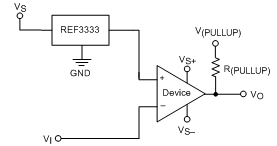JAJSGH6A November 2018 – November 2022 TLV1704-SEP
PRODUCTION DATA
7.4.1 Setting Reference Voltage
Using a stable reference is important when setting the transition point for the TLV1704-SEP device. The REF3333, as shown in Figure 7-2, provides a 3.3-V reference voltage with low drift and only 3.9 μA of quiescent current.
 Figure 7-2 Reference Voltage for the TLV1704-SEP
Figure 7-2 Reference Voltage for the TLV1704-SEP